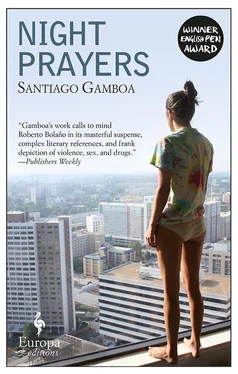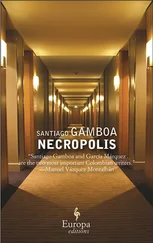She held the telephone away from her and said: what time? I looked at my diary, it would have to be about midnight, is that possible? Aurora told her and nodded. Perfect, midnight tomorrow.
I hadn’t thought it would be so easy, let alone so quick, to arrange it, and neither had Aurora.
“And now what? Do you really not want me to do anything for you?”
I poured myself another gin. “Nobody said that, but for now let’s drink.”
She left just before dawn, when the subway opened. I lay in bed thinking about everything that had happened since my arrival in Bangkok.
Through the window I saw the night at its darkest point and imagined Manuel in his cell, hoping that my strength or my intuition or even my lack of scruples would help me find Juana and take her away with me.
The following day, there was an arranged visit to the National Museum. An imposing place, surrounded by red and sepia-colored trees. All totally symmetrical and perfect. They explained to us the rules of battle and code of honor of the samurai. Also that it took them three days to dress for those battles. I remembered Kurosawa’s film Kagemusha , in which a simple archer fires off a blind shot in the middle of the night.
After this we had the afternoon free, then in the evening a debate with pupils and teachers of the Faculty of Hispanic Studies at the University of Tokyo. Much to my surprise, the Salvadoran writer Horacio Castellanos Moya was in the audience, there on a grant from the Japan Foundation. One of the teachers, a friend of his, had told him we were coming and he wanted to say hello. I had met him years earlier, in Madrid, along with Rodrigo Rey Rosa.
When the talk was over, the professors invited us to an informal dinner at a beer hall in Shibuya, which pleased me, because it was near La Caverna (or so I assumed). We drank beer from pitchers, ate dozens of little dishes of exquisite fish, talked about the divine and the human, and, of course, about Japanese literature: about the writer who was the most widely read and most fashionable outside Japan, Murakami; and about Oe, who for me was the best; as well as Tanizaki, a classic, as was Kawabata — his story “First Snow on Fuji” is a masterpiece — the indescribable Mishima, much admired by Marguerite Yourcenar; or the strange Osamu Dazai, who led a dissolute life in Tokyo. Of course nobody knew the Burns Bannion novels, all set in Japan and with openings like this: “I’ve never seen a bottle of beer broken into so many pieces of chiisai . A bottle of Sapporo beer, large size.”
When dinner was over, I asked Horacio if he’d like to go somewhere with me, without being any more specific than that. He was surprised that I knew a place in Tokyo, but he said nothing, so we went, and as we walked down the steps at the entrance Aurora approached and greeted me.
“Give us two pisco sours but make four,” I said.
“Sure,” she said.
Then she leaned toward me and whispered in my ear: she’s already in the room, she’s waiting for you, you can talk to her now. I saw her from a distance: a pretty woman, but one who looked as if she’d lived through wars and shipwrecks. Aurora introduced us, brought the drinks, and started talking to Horacio.
Susana’s northwestern accent was even more marked than Cindy’s. I bought her a drink and got straight down to business.
“I’m told you’re a friend of Juana Manrique, that you know her. I’m a friend of her brother Manuel. I’m here on his behalf.”
She gave me a guileless look and said, Manuel? Juana never stopped talking about him, day or night, he was the love of her life.
“That’s why I’d like to know about her, is she still in Japan?”
Susana frowned. “Why are you asking me that? Don’t know where she is, or what?”
A light came on, a warning light. I’d have to take it nice and slowly. The natural defenses of a woman injured by life had been activated. I ordered another pisco sour.
“Manuel’s in prison in Thailand and I’m trying to get him out. Or rather: the Colombian Foreign Ministry is trying to. I’m a diplomat. I’ve come to Japan on personal business and I’m using the opportunity to look for Juana, it’s urgent she should know what’s going on. Manuel’s desperate to see her. He was on his way to Tokyo when he was arrested. He’d been searching for her, did you know she hadn’t been in touch with Manuel for more than three years? did you know that?”
For a while she sat pensively sipping her pisco sour. Then she opened her handbag and took out a pack of menthol cigarettes. She lit one (I was surprised to discover that smoking was permitted in bars in Tokyo).
“Look,” she said, “I knew Juana was running away from something. She loved her brother but didn’t want him to know she was here, especially that she was in this line of work. They kept a close eye on her. When she was working on the street, she always had someone close by, never letting her out of his sight. I don’t know why they treated her like that. We lived together for about eight months. Or rather: they kept us in the same room, locked up. That’s not living. They always had their eye on her. Juana had style, she was well educated and spoke English; she earned a lot of money for them and they didn’t want to lose her.”
I was starting to get impatient. At the other table Horacio was chatting with Aurora.
“I need to talk to her, where is she? It’d take me a long time to explain, but right now it might be a matter of life and death.”
Susana gave me a strange, almost angry look. “She’s not here anymore, she ran away eleven months ago.”
“She ran away?” I cried.
Fortunately the bar was noisy.
But Susana was afraid to say too much, to go into details. She may have been questioned many times, maybe threatened. I felt as if I was stepping on shifting sands. I ordered another two piscos and took out my diplomatic passport.
“You don’t have to believe me if you don’t want to, here’s my passport, I have nothing to hide. You can tell me where she went and nothing will happen to you. As soon as I know where she is I’ll go find her, that’s what her brother would have done. I promised him.”
Susana breathed in deeply, then took a long sip of her drink. “She went to Tehran with her Iranian bodyguard. They fell in love and he tried to pay her debt. They wouldn’t accept it and one day they disappeared. We never heard from her again. They kept me locked up for a month because of it.”
Tehran, Tehran, I thought. And what was the bodyguard’s name?
She thought for a moment, lit another cigarette, as if calling on her memory, and finally said: I don’t know his name, they called him Jaburi.
La Caverna closed at two o’clock, but we went and had a last drink at a nearby bar that was like a doll’s house, with a very low ceiling and a kind of little wooden balcony around each table. Japanese beer is very good. While we were in this second bar, we heard ringing. It was Susana’s cell phone. She spoke for a while with her hand over the receiver and when she hung up she said she had to go. I told her that if she was going to the Sheraton I’d take her. She laughed and said, no, cheeky, it’s another hotel.
It was already after three, so I called a taxi and gave Horacio a farewell hug, thanking him for the company.
The following day they picked us up early to visit the Buddhist temple of Asakusa, and then Kamakura. It was said the French writer and traveler Pierre Loti had been there, and he was an old traveling companion of mine (especially on journeys to Peking, but also to Jerusalem, Turkey, and Morocco). Displaying his proverbial racism, Loti says the Japanese smell of “rancid camellia oil.” All the same, his descriptions of the Buddhist temples are remarkable. I was so upset by what I’d heard about Juana that I barely noticed Kamakura. The temple of the great Buddha is beautiful and harmonious, and surrounded by a colorful garden, but to be honest, having seen the ancient city of Pathan, just outside Kathmandu, it didn’t strike me as anything much. What I liked most was the ride, and the fact that for most of the time we were held up by the heavy traffic on the way out of Tokyo.
Читать дальше












